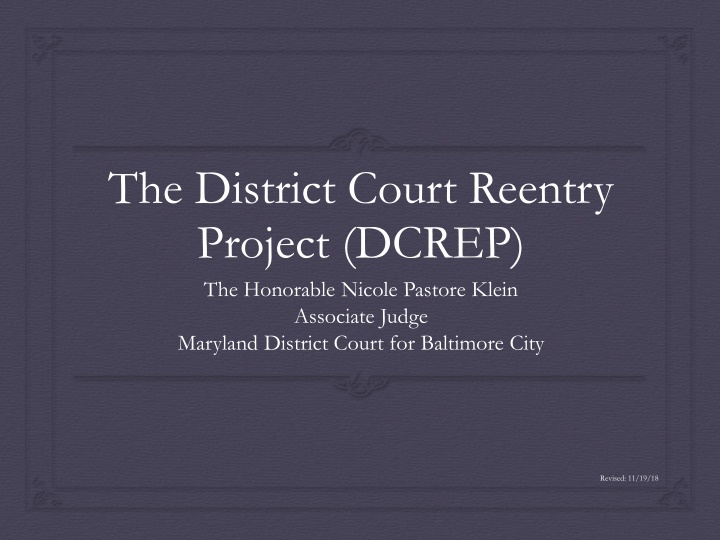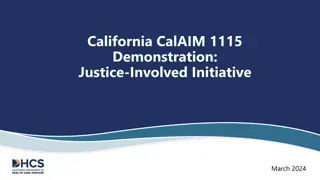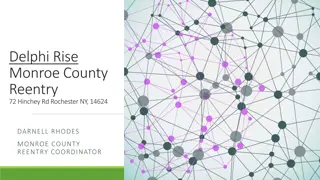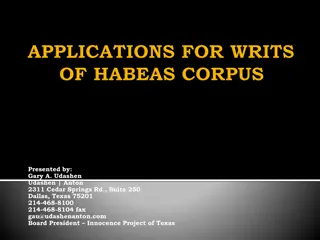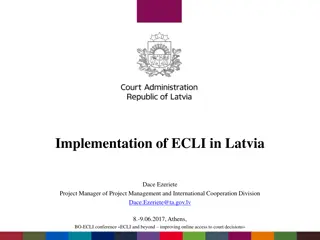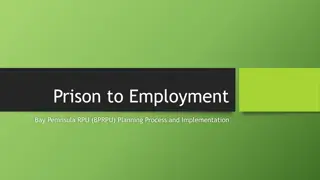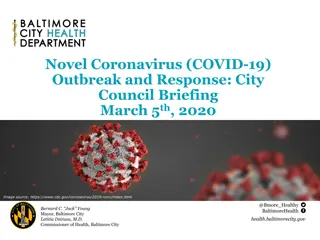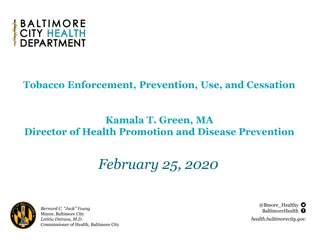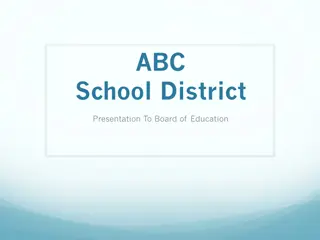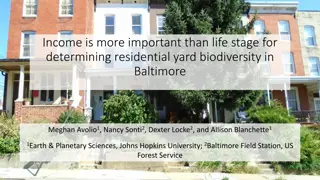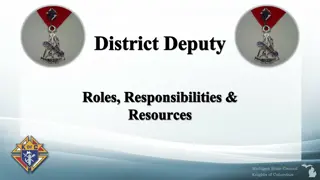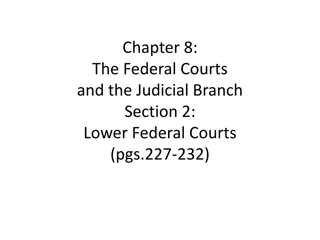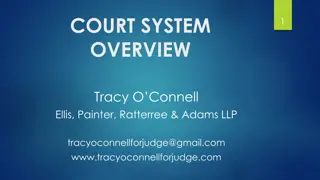The District Court Reentry Project (DCREP) in Baltimore City
The District Court Reentry Project (DCREP) was initiated by Judge Nicole Pastore Klein in response to the lack of employment opportunities for individuals with criminal records in Baltimore City. The project aims to assist ex-offenders in finding educational and job placement opportunities by collaborating with various programs and gaining support from the justice system. By providing incentives and breaking the cycle of incarceration, DCREP strives to reduce recidivism and create a positive impact on the community.
Download Presentation

Please find below an Image/Link to download the presentation.
The content on the website is provided AS IS for your information and personal use only. It may not be sold, licensed, or shared on other websites without obtaining consent from the author.If you encounter any issues during the download, it is possible that the publisher has removed the file from their server.
You are allowed to download the files provided on this website for personal or commercial use, subject to the condition that they are used lawfully. All files are the property of their respective owners.
The content on the website is provided AS IS for your information and personal use only. It may not be sold, licensed, or shared on other websites without obtaining consent from the author.
E N D
Presentation Transcript
The District Court Reentry Project (DCREP) The Honorable Nicole Pastore Klein Associate Judge Maryland District Court for Baltimore City Revised: 11/19/18
Origin: The idea for the DCREP originated after Baltimore City s unrest in April 2015. The expression of dissatisfaction with the lack of employment opportunities was felt by individuals throughout the City and also in District Court. People with criminal records were having difficulty finding a job. To combat this issue, Judge Pastore Klein made it her mission to discover new and existing opportunities.
Purpose and Planning: The DCREP was created to help find opportunities for educational advancement with job placement. Volunteers contacted 43 programs claiming to have a promise of work or education. Unfortunately, of the 43 programs, only 11 had the capability of taking individuals on a rolling basis and not turning people away. All 11 programs accepted ex-offenders; aiding to the goal of DCREP. The DCREP volunteers worked with the programs to develop requirements and referral forms for individuals in the criminal justice system.
Getting DCREP Started: The DCREP scheduled meetings with each of the supervising State s Attorneys and Public Defenders in the three Criminal District Courthouses in Baltimore City to explain the goal of the program. To make the DCREP successful, there needed to be willing participation from both the prosecution and the defense. The DCREP needed State s Attorneys who would be willing to offer participation in the DCREP in lieu of jail time or as a condition of probation. The DCREP needed Public Defenders and private defense counsel to encourage clients to consider DCREP as such.
DCREP in the Justice System: The court system should not simply be about punishment but should, where possible, give a defendant the opportunity to turn their life around by economically empowering them. The DCREP allows defendants to break the cycle by pursuing opportunities they may not have had access to otherwise. The DCREP gives folks the opportunity to be role models and productive members of society. The hope is that participation in the DCREP will reduce recidivism and will provide a more positive outlook for the City.
Cooperation with Judges: For the DCREP to work, District Court judges needed to be willing to give people the opportunity to work as opposed to incarceration. Additionally, success depended on the judges providing an incentive for those individuals to want to complete the program and stay gainfully employed. Possible incentives include: Probation may end early, reduced by one half, or change from supervised to unsupervised upon graduation from the DCREP. Probation fees may be waived. Guilty finding may be struck, and the individual may receive a probation before judgment. In some specialty courts and early resolution dockets, State s Attorney s have postponed cases to allow and encourage employment for case dismissals and stets.
DCREP First Year: September 2016: Rolled out to the entire Baltimore City District Court. First 6 Months: Over 50 individuals enrolled and 1/3 of the judges participated in DCREP. March 9, 2017: First graduation ceremony for 12 individuals at the Hargrove District Court. Maryland s Chief Judge Mary Ellen Barbera and District Court Chief Judge John Morrissey addressed the participants; Ray Lewis gave the commencement speech. Under Armour and Wes Moore provided gift bags for the graduates. Each graduate s friends, family, probation agent, defense attorney, and program sponsor attended the graduation to celebrate their accomplishments. Graduation became a holistic approach to celebrating an individual s accomplishments while recognizing that an individual s past does not need to dictate his/her future.
DCREP Referral Expansion: After 6 months, the program expanded to accept referrals, ie., individuals who have had their cases dismissed or were placed on the stet docket, prayed a jury trial, or been referred by their attorney or another entity prior to their trial date. Referred individuals are those who have otherwise appeared in our court system and/or may have had records that prevented them from obtaining employment on their own. By sitting in our courtrooms, these individuals have requested assistance securing opportunities through the DCREP. We treat referrals just as we do probationers and keep a separate referral document to follow up with these individuals to ensure they are included as part of the graduation recognition.
DCREP Pretrial Expansion: After 18 months, DCREP expanded to accept individual defendants as part of their pretrial supervision requirements. Pretrial services worked closely with the DCREP and now specifically requests that DCREP be made a condition of pretrial release during bail review hearings. These individuals are referred to America Works, a program willing to work with individuals with open charges. Specially assigned pretrial agents and America Works liaisons provide daily updates to the DCREP which then provides cumulative updates to the referring judges.
DCREP Case Management Probation Probation Each probationer assigned to DCREP has an agent. Twice a month DCREP is in contact with the assigned agent to confirm attendance in designated program and/or violation status. If a probationer is in violation or maybe in danger of becoming a violator, the referring Judge is notified via formal informative report or 42B. Probation agents are given leeway to make alternative selections from 1 of the 17 participating programs.
DCREP Case Management Referral Referral Referrals are followed up via the program they have been assigned to and verbal one on one contact. If a participant has not been responsive after three attempts of contact, they are removed from the program.
DCREP Case Management Pretrial Pretrial All Pretrial participants are managed by America Works for all job readiness and placement needs unless otherwise specified. Once a week, Pretrial Services and America Works meets to discuss each case and its progress; judges receive a weekly emailed update report that details the individual s status/progress and/or trail outcomes. If a participant is out of compliance with their pretrial conditions the judge is notified via rescind immediately.
DCREP Document Management Once a referral is received in the courtroom, the courtroom clerk given the original copy to the judges administrative assistant. At that time they are uploaded to the DCREP coordinator. When the referrals are received by DCREP they are sent directly to the referred program for immediate follow- up. Each participant is manually entered into a google doc file into its perspective assigned tab location i.e., probation, pretrial or referral. For probation, the agent assignment is requested from Parole and Probation via email. Each participant also receives a color coded file with a label, which is where all hard file documents are maintained in the DCREP area.
DCREP Programs: The DCREP also affords individual's an opportunity to find employment with or without the equivalent job training. Job readiness programs range from two weeks to six months. Length of training/readiness depends on whether or not an individual is receiving direct assistance for immediate job placement because of previous work experience or they are studying to earn the appropriate certificate.
13 Programs: (Rolling Basis) America Works Project S.E.R.V.E. by Living Classrooms Christopher Place Employment Academy (housing provided) Project JumpStart Civic Works STRIVE Training Program by the Center for Urban Families Goodwill Industries of the Chesapeake Vehicles for Change Maryland New Directions Maritime and Logistics Training Program JARC- Jane Addams Resource Corporation Next Course Training Academy by St. Vincent DePaul Northwest Career Center (REC) Bridge 2 Career
4 Programs: (Quarterly) Four programs accept referrals on a quarterly basis: Maryland Multi-Housing Association Power52 (solar energy program created by Ray Lewis) Maryland Food Bank Caroline Center
Training Offered for Certification in: IC4 Global Computer Carpentry Auto Mechanic OSHA Compliance Brownfield Remediation Maritime Careers at the Port of Baltimore Catering and Food Service Management Solar Panel Installation Construction Welding Energy Retrofitting Computer Numerical Control Stormwater Management Warehouse Support DNR Land Resources Transportation Fundamentals of Manufacturing CNA, GNA and Pharmacy Technician Forklift Operation
DCREP Statistics: Graduation Ceremonies: A person is considered a graduate if they obtain and maintain a job for 3 consecutive months. (this is in addition to any certification/training requirements) March 9, 2017: First graduation ceremony for 12 graduates. August 25, 2017: Second graduation ceremony for 26 graduates. December 5, 2017: Third graduation ceremony for 28 graduates. May 4, 2018: Fourth graduation ceremony for 25 graduates. October 24, 2018: Fifth graduation ceremony for 32 graduates. 123 total graduates
DCREP Statistics: Statistics: All 28 judges sitting on the City bench are participating in the DCREP. 4 specially assigned probation agents in Baltimore City. 2 specially assigned pretrial services agents in Baltimore City. Over 350 people are currently enrolled in the DCREP: 200 individuals as a condition of their probation 50 individuals in the pretrial program 100 individuals as referrals
DCREPs Evolution From inception through its first 18 months, DCREP was run solely by Judge Pastore Klein and unpaid law volunteers and interns. As of April 2018, DCREP received the grant award from the Governor's Office of Crime Control and Prevention (GOCCP)- Edward J. Byrne Memorial Justice Assistance Grant (BJAG), to hire its first paid employee. DCREP is in need to continuing the trend of hiring more paid staff to maintain and outline one of Baltimore City s most effective reentry programs, to continue to grow the program outside of the scope of the Baltimore City s Judiciary.
Hopes for the Future: The program will continue to serve probationers, pretrial defendants, and individuals who contact the court on their own seeking help and opportunities. DCREP hopes to continually increase the number of participants in the program, especially through the pretrial program since pretrial services will now specifically request DCREP during bail review hearings. DCREP plans at least 2 graduation ceremonies in the coming year for participants who have successfully completed the program. DCREP hopes to secure funding for 3 permanent DCREP staff members to continue to aid the reentry population. DCREP wishes to add to it SharePoint by incorporating a more sustainable database for data maintenance.
